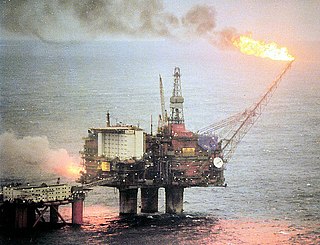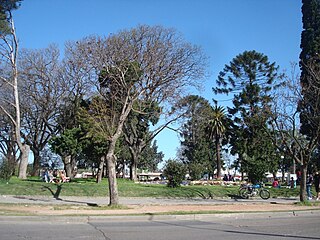
An oil refinery or petroleum refinery is an industrial process plant where petroleum is transformed and refined into products such as gasoline (petrol), diesel fuel, asphalt base, fuel oils, heating oil, kerosene, liquefied petroleum gas and petroleum naphtha. Petrochemical feedstock like ethylene and propylene can also be produced directly by cracking crude oil without the need of using refined products of crude oil such as naphtha. The crude oil feedstock has typically been processed by an oil production plant. There is usually an oil depot at or near an oil refinery for the storage of incoming crude oil feedstock as well as bulk liquid products. In 2020, the total capacity of global refineries for crude oil was about 101.2 million barrels per day.

Energy security is the association between national security and the availability of natural resources for energy consumption. Access to cheaper energy has become essential to the functioning of modern economies. However, the uneven distribution of energy supplies among countries has led to significant vulnerabilities. International energy relations have contributed to the globalization of the world leading to energy security and energy vulnerability at the same time.

Norway is a large energy producer, and one of the world's largest exporters of oil. Most of the electricity in the country is produced by hydroelectricity. Norway is one of the leading countries in the electrification of its transport sector, with the largest fleet of electric vehicles per capita in the world.

ANCAP is a state-owned company in Uruguay, it was created by Law No. 8.764, on October 15, 1931 during the administration of Gabriel Terra. Its Fundamental Law entrusts it with the power to exploit and administer the monopoly of national Alcohol and Fuel, portland cement, as well as import, refine and sell petroleum derivatives. It operates the only oil refinery in Uruguay in La Teja, inaugurated in 1937 next to its working-class neighborhood with homes with patios and gardens, President Gabriel Terra described the company as the "pride of Uruguay", it has a capacity of 50,000 barrels per day. ANCAP has a long-term corporate credit rating "BB−" with positive outlook by Standard & Poor's.

The fossil fuels lobby includes paid representatives of corporations involved in the fossil fuel industry, as well as related industries like chemicals, plastics, aviation and other transportation. Because of their wealth and the importance of energy, transport and chemical industries to local, national and international economies, these lobbies have the capacity and money to attempt to have outsized influence on governmental policy. In particular, the lobbies have been known to obstruct policy related to environmental protection, environmental health and climate action.
The mining sector contributes only 0.1% to the GDP of Uruguay. Uruguay's mineral commodities include clays, semiprecious gemstones, gold, iron and steel, sand and gravel, and stone. Uruguay has no proven natural gas or oil reserves but it does have substantial hydroelectric capacity.
Energy in Paraguay is primarily sourced from hydropower, with pivotal projects like the Itaipu Dam, one of the world's largest hydroelectric facilities. This reliance underscores the need for a robust infrastructure, including efficient transmission networks and distribution systems, to leverage the country's renewable resources fully.

The environmental impact of the petroleum industry is extensive and expansive due to petroleum having many uses. Crude oil and natural gas are primary energy and raw material sources that enable numerous aspects of modern daily life and the world economy. Their supply has grown quickly over the last 150 years to meet the demands of the rapidly increasing human population, creativity, knowledge, and consumerism.

The electricity sector of Uruguay has traditionally been based on domestic hydropower along with thermal power plants, and reliant on imports from Argentina and Brazil at times of peak demand. Over the last 10 years, investments in renewable energy sources such as wind power and solar power allowed the country to cover in early 2016 94.5% of its electricity needs with renewable energy sources.

Energy in Uruguay describes energy and electricity production, consumption and import in Uruguay. As part of climate mitigation measures and an energy transformation, Uruguay has converted over 98% of its electrical grid to sustainable energy sources. Fossil fuels are primarily imported into Uruguay for transportation, industrial uses and applications like domestic cooking. Four hydroelectric dams provide much of the country's energy supply.

Raúl Fernando Sendic Rodríguez is a Uruguayan politician. He was the Vice President of Uruguay from 1 March 2015 to 13 September 2017.

La Teja is a barrio of Montevideo, Uruguay. The neighborhood has a mix of residential and industrial properties, mostly occupied by working class communities, including with a number of informal settlements built on former industrial sites.

The Port of Montevideo, in the northern part of the Old City of Montevideo, Uruguay, is one of the major ports of South America and plays a very important role in the economy of Uruguay. Notably the port includes a number of important facilities including one the countries main tourism terminals and the La Teja Refinery which processes the bulk of the countries oil.

Libertador Avenue is a major avenue in Montevideo, Uruguay. It stretches north from the Legislative Palace in Aguada to Plaza Fabini in Centro, and is named after Juan Antonio Lavalleja, revolutionary figure and politician, who led the group of the Thirty-Three Orientals in the insurrection for the independence of Oriental Province.

The Bahrain Petroleum Company (BAPCO) is an integrated petroleum company that is the national oil company of Bahrain.
Uruguay is a petroleum-importing country, and most of the industry is controlled by the state owned industry ANCAP. ANCAP operates both the only refinery in Uruguay, La Teja Refinery and the distribution of gas within the country.
The Uruguayan savanna ecoregion used to be covered by grasslands, palm savannas, and gallery forests along the Uruguay, Negro, Yaguarí, Queguay, and Tacuarembó rivers. Unfortunately, agriculture and cattle ranching have heavily altered these natural communities. The savannas are critically endangered because there are few small isolated patches of intact habitat remaining. The whole ecoregion has been severely altered by cattle ranching, one of the main pillars of the national economy in Uruguay. About 80% of Uruguayan territory is used for cattle ranching on natural and artificial savannas.

Indian Oil Corporation Limited, trading as IndianOil, is an Indian multinational oil and gas company under the ownership of the Ministry of Petroleum and Natural Gas, Government of India. Registered in Mumbai but headquartered in New Delhi, it is a public sector undertaking whose operations are overseen by the Ministry of Petroleum and Natural Gas. Indian Oil is ranked 94th on the Fortune Global 500 list of the world's biggest corporations as of 2022. It is the largest government owned oil producer in the country both in terms of capacity and revenue. It has consolidated refining capacity of 80.55MMTPA which it intends to increase to 107MMTPA by 2024-25. As of 31 March 2021, Indian Oil's employee strength is 31,648, out of which 17,762 are executives and 13,876 non-executives, while 2,776 are women, comprising 8.77% of the total workforce. As On 31.3.2024 IOC Employed 30,321 Employees. Out Of Which Executives Account 18,570 & Non Executives Account 11,751.

Climate change in Ghana is impacting the people in Ghana in several ways as the country sits at the intersection of three hydro-climatic zones. Changes in rainfall, weather conditions and sea-level rise will affect the salinity of coastal waters. This is expected to negatively affect both farming and fisheries. Low precipitation, drought and wild fires are also some major effects associated with climate change in Ghana.















